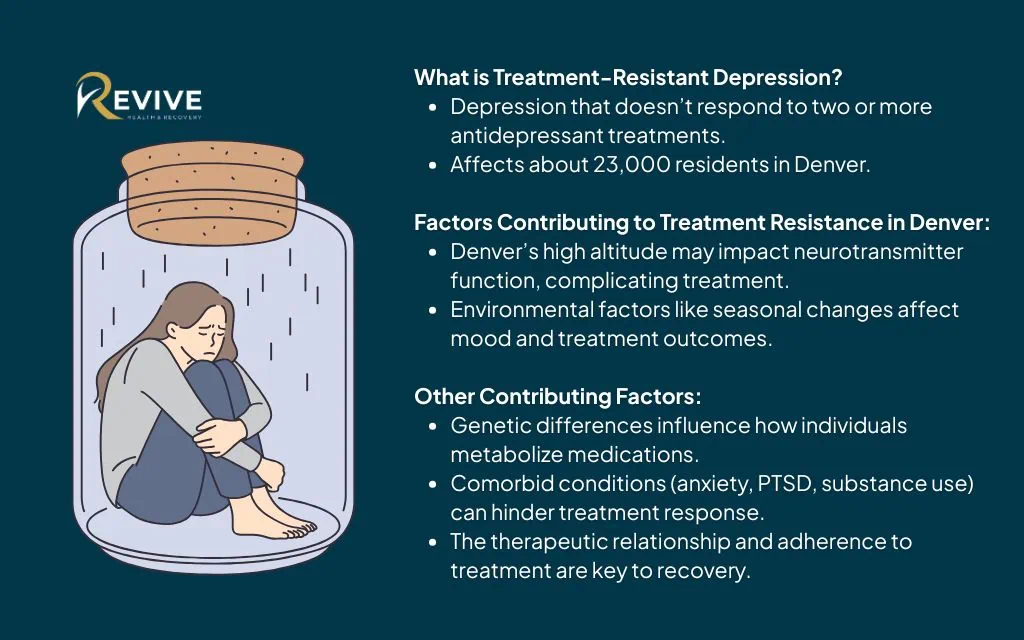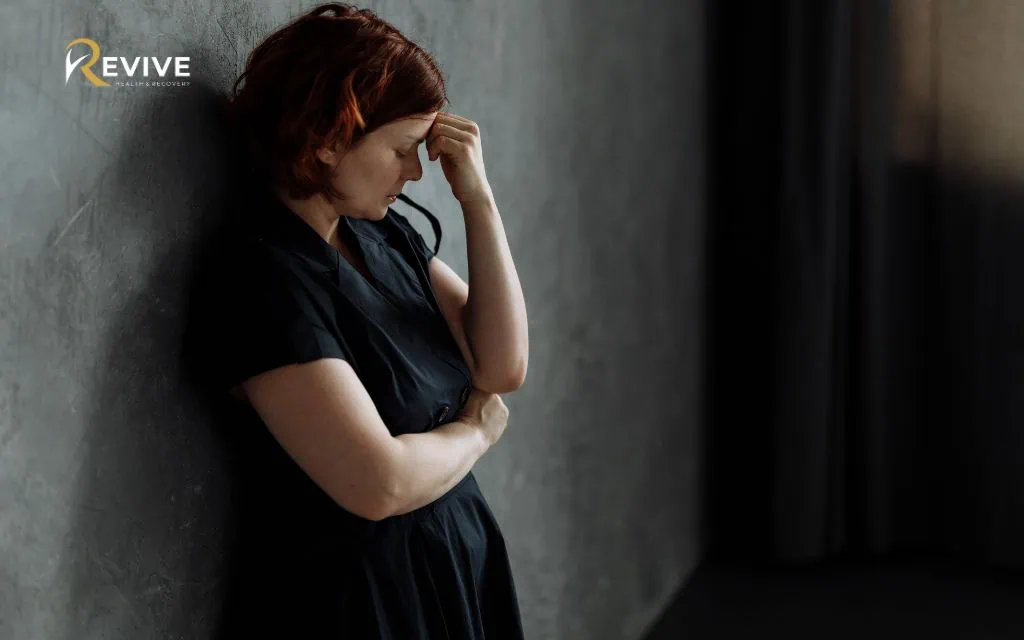When standard antidepressants fail to provide relief, treatment-resistant depression Denver residents face can feel overwhelming. Affecting 30% of people with major depressive disorder, TRD requires specialized interventions beyond traditional approaches. Denver offers cutting-edge treatments including TMS therapy, ketamine infusions, ECT, and innovative clinical trials.
With renowned institutions like UCHealth, Denver Health, and the Johnson Depression Center at CU Anschutz, Colorado’s capital has become a regional hub for advanced depression care. This comprehensive guide explores Denver’s TRD treatment landscape, from FDA-approved neuromodulation therapies to groundbreaking research opportunities, helping you navigate the path from treatment resistance to recovery.
Understanding treatment-resistant depression in Denver
Defining treatment-resistant depression and its prevalence in Denver
Treatment-resistant depression occurs when depression fails to respond to two or more adequate antidepressant trials. In Denver, approximately 23,000 residents potentially face this challenging condition. The Mile High City’s unique environmental factors create distinct patterns that may contribute to treatment resistance.
Denver’s altitude of 5,280 feet may contribute to higher depression and suicide rates due to neurochemical effects on neurotransmitter function. This elevation can affect serotonin and dopamine levels, potentially complicating standard treatment approaches. These factors contribute to Colorado’s challenging mental health rankings, currently sitting at 46th nationally despite ranking 17th in access to care.

Why standard treatments sometimes fail
Several factors contribute to treatment resistance in depression patients. Genetic variations affect how individuals metabolize medications, making some antidepressants less effective. Pharmacogenomic differences can explain why certain medications work for some patients but not others.
Comorbid conditions like anxiety disorders, PTSD, or substance use issues can interfere with treatment response. Environmental factors specific to Denver, including seasonal light changes and altitude effects, may also impact treatment outcomes. The therapeutic relationship and treatment adherence play crucial roles in recovery success.
Advanced therapeutic interventions for TRD in Denver
Transcranial magnetic stimulation therapy
TMS therapy represents a breakthrough for treatment-resistant depression Denver patients. This FDA-approved treatment uses magnetic pulses to stimulate specific brain regions associated with mood regulation.
Denver TMS providers include:
- UCHealth Behavioral Health Services
- Inspire TMS Denver
- Axis Integrated Mental Health
Success rates show 58% symptom reduction with 37% achieving remission. Treatment involves 20-30 sessions over 4-6 weeks. Most major insurance plans in Colorado now cover TMS therapy for FDA-approved indications, making this advanced treatment more accessible to Denver residents.
Ketamine and esketamine treatment options
Ketamine therapy offers rapid relief for severe treatment-resistant depression cases. Unlike traditional antidepressants that take weeks to work, ketamine can provide improvement within hours to days.
Denver ketamine centers offer:
- Johnson Depression Center Esketamine Clinic at CU Anschutz
- Summit Medical ketamine infusions
- Klarisana ketamine therapy
Patients can choose between IV ketamine infusions and Esketamine (Spravato) nasal spray. Esketamine has broader insurance acceptance, while IV ketamine requires self-pay in most cases. Both options require careful monitoring and safety protocols during treatment.
Electroconvulsive therapy services
Modern ECT remains highly effective for severe, treatment-resistant cases. Despite past stigma, today’s ECT uses precise techniques with improved safety profiles.
Denver ECT providers include:
- UCHealth Longs Peak Medical Center
- Denver Health behavioral services
ECT shows response rates exceeding 70% in appropriate candidates. Modern techniques minimize memory side effects while maintaining effectiveness. The procedure involves brief electrical stimulation under general anesthesia, typically requiring 6-12 sessions.
Medication adjustments and augmentation strategies
Pharmacogenetic testing in Denver
GeneSight testing helps guide medication selection based on individual genetic profiles. This personalized approach can prevent trial-and-error prescribing that delays recovery.
Denver providers offering genetic testing:
- Denver Wellness Associates
- Maia Primary Care & Wellness
- HighPoint Psychiatry
Insurance coverage for pharmacogenomic testing varies, but many Colorado plans now recognize its value for improving treatment outcomes. This testing examines how genes affect medication metabolism, helping doctors choose the most effective treatments.
Advanced medication strategies
Augmentation therapy combines antidepressants with other medications to enhance effectiveness. Common augmentation agents include lithium, antipsychotics, or thyroid hormones. Novel approaches involve buprenorphine or ketamine derivatives for treatment-resistant cases.
Combination therapy approaches may include multiple antidepressants with different mechanisms of action. Managing side effects and drug interactions requires careful monitoring by experienced psychiatrists familiar with complex medication regimens.
Innovative approaches under investigation
The CU Denver Center for Psychedelic Research conducts psilocybin studies for treatment-resistant depression. Colorado’s progressive stance on psychedelic research positions Denver as a leader in breakthrough treatments.
Clinical trials depression Denver institutions conduct provide access to experimental protocols and future treatments. Participation in pharmaceutical research studies may offer hope when standard approaches fail.
Intensive outpatient programs for TRD in Denver
Specialized IOP programs
Intensive outpatient programs provide comprehensive care without hospitalization. These programs combine multiple therapeutic approaches in structured environments.
Denver IOP providers include:
- Mental Health Center of Denver TRD programs
- Pathlight Mood & Anxiety Center
- Denver Springs intensive programs
Programs typically involve group therapy, individual sessions, and psychiatric care. Family involvement strengthens support systems crucial for recovery. These programs help patients transition from inpatient care or provide intensive support for outpatient treatment.
Comprehensive treatment approaches
Effective TRD treatment addresses co-occurring disorders like anxiety, PTSD, or substance use. Integration of multiple therapeutic modalities provides the best outcomes for complex cases.
Lifestyle interventions include exercise programs, nutrition counseling, and stress management techniques. Progress measurement involves regular assessment tools to track improvement and adjust treatment plans accordingly.
Clinical trials and research opportunities in Denver
Leading research institutions
The Johnson Depression Center at CU Anschutz participates in the National Network of Depression Centers, providing access to cutting-edge research. The Mood Outcomes Program conducts research initiatives that advance TRD treatment understanding.
Current clinical trials offer Denver residents opportunities to access experimental treatments before general availability. University of Colorado research partnerships bring world-class depression research to the local community.
Participating in depression research
Clinical trial participation offers benefits for patients with few remaining treatment options. Studies provide access to innovative therapies while contributing to depression treatment advancement.
Informed consent processes protect patient rights and ensure understanding of study participation. Research coordinators help determine study eligibility and explain potential benefits and risks.
Navigating treatment-resistant depression Denver treatment landscape
Insurance and financial considerations
Colorado mental health parity laws require equal coverage for mental health and medical treatments. Coverage for advanced therapies like TMS, ketamine, and ECT varies by provider and specific protocols.
Denver’s mental health sales tax generates $45 million annually for innovative treatment programs. This first-in-the-nation city-wide mental health tax supports breakthrough depression therapies and expands access to care.
Many providers offer sliding scale fees and assistance programs for uninsured or underinsured patients. Contact treatment centers directly to discuss financial options and payment plans.
Coordinating care between providers
Building an effective TRD treatment team requires coordination between specialists. Communication between providers ensures integrated care and prevents treatment conflicts.
Managing multiple treatment modalities requires careful scheduling and progress monitoring. Patient advocacy and care coordination services help navigate complex treatment systems.
FAQs about Treatment-resistant depression Denver
How do I know if I have treatment-resistant depression?
TRD typically means you haven’t responded to at least two different antidepressant medications at adequate doses for sufficient duration. If multiple treatments haven’t provided significant improvement, consult a psychiatrist specializing in TRD. Revive Health Recovery can help coordinate comprehensive evaluation with Denver’s leading specialists.
Are advanced TRD treatments covered by insurance in Colorado?
Most major insurance plans cover TMS therapy for FDA-approved indications. Ketamine coverage varies, while Esketamine has broader acceptance. Contact Revive Health Recovery at (303) 268-4655 to discuss insurance verification and coverage options for specific treatments.
What are success rates for advanced TRD treatments?
TMS shows 58% symptom improvement with 37% remission rates. Ketamine provides rapid relief for many patients within hours to days. ECT achieves response rates exceeding 70% in appropriate candidates. Revive Health Recovery works with Denver’s premier specialists to ensure you receive the most effective treatment.
How long do advanced TRD treatments take to work?
Treatment timelines vary significantly. TMS requires 4-6 weeks of daily sessions, ketamine may provide rapid relief but needs ongoing maintenance, and ECT typically shows improvement after 6-12 sessions. Your Denver treatment team will monitor progress closely.
Are clinical trials available for new TRD treatments in Denver?
Denver institutions like CU Anschutz regularly conduct clinical trials for novel TRD treatments. Contact research coordinators to learn about current studies and eligibility. Revive Health Recovery maintains connections with research programs to help patients access cutting-edge treatments.
Why choose Revive Health Recovery for TRD support in Denver
Specialized TRD expertise and community connections
Our team understands the unique challenges treatment-resistant depression Denver residents face. We collaborate with UCHealth, Denver Health, Johnson Depression Center, and other premier facilities for seamless care coordination.
Located at 1427 S Federal Blvd, we maintain strong relationships with Denver’s advanced treatment providers. Our specialized expertise ensures you receive appropriate referrals and coordinated care throughout your TRD journey.
Integrated treatment approach and personalized care
We combine evidence-based therapy with medication management support and lifestyle interventions. Every TRD case requires individualized treatment strategies addressing specific symptoms, treatment history, and recovery goals.
Our comprehensive support system extends beyond clinical treatment. We provide family education, crisis planning, and ongoing support to help navigate complex TRD treatment with confidence.
Taking action: Your TRD recovery journey starts here
Treatment-resistant depression doesn’t mean hopeless depression. Denver’s advanced treatment landscape offers multiple pathways to recovery, from FDA-approved neuromodulation therapies to cutting-edge clinical trials.
At Revive Health Recovery, we understand TRD requires specialized expertise, personalized care, and unwavering support throughout your treatment journey. Our experienced team helps you explore advanced treatment options, coordinate with Denver’s premier specialists, and develop comprehensive recovery plans.
Don’t let treatment-resistant depression control your life any longer. Contact Revive Health Recovery today at (303) 268-4655 for a confidential consultation. Available 24/7, our compassionate team will help you take the first step toward breakthrough treatment and lasting recovery.
You can also reach us at contact@revivehealthrecovery.com to learn more about our TRD support services. Begin your journey from treatment resistance to renewed hope with Denver’s trusted partner in advanced depression care.



